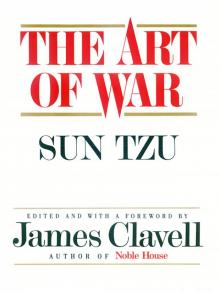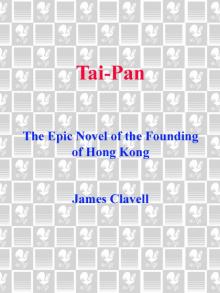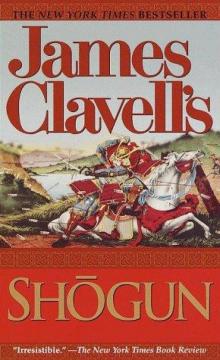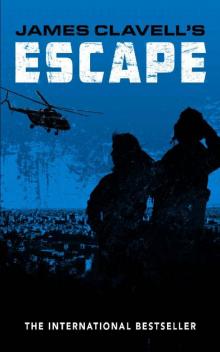- Home
- James Clavell
The Art of War Page 6
The Art of War Read online
Page 6
On dispersive ground, inspire your men with unity of purpose. On facile ground, see that there is close connection between all parts of the army. On contentious ground, hurry up your rear guard. On open ground, keep a vigilant eye on your defenses, fearing a surprise attack.
On ground of intersecting highways, consolidate your alliances.
On serious ground, ensure a continuous stream of supplies. On difficult ground, keep pushing on along the road.
On hemmed-in ground, block any way of retreat to make it seem that you mean to defend the position, whereas your real intention is to burst suddenly through the enemy’s lines.
In A.D. 532, Kao Huan, afterward emperor and canonized as Shen-wu, was surrounded by a great army under Ehr-chu Chao and others. His own force was comparatively small, consisting only of 2,000 horse and something under 30,000 foot. The lines of investment had not been drawn very closely together, gaps being left at certain points. But Kao Huan, instead of trying to escape, actually made a shift to block all the remaining outlets himself by driving into them a number of oxen and donkeys roped together. As soon as his officers and men saw that there was nothing for it but to conquer or die, their spirits rose to an extraordinary pitch of exaltation, and they charged with such desperate ferocity that the opposing ranks broke and crumbled under their onslaught.
On desperate ground, proclaim to your soldiers the hopelessness of saving their lives. The only chance of life lies in giving up all hope of it.
For it is the soldier’s disposition to offer an obstinate resistance when surrounded, to fight hard when he cannot help himself, and to obey promptly when he has fallen into danger.
In A.D. 73, when Pan Ch’ao arrived at Shan-shan, Kuang, the king of the country, received him at first with great politeness and respect; but shortly afterward his behavior underwent a sudden change, and he became remiss and negligent.
Pan Ch’ao spoke about this to the officers of his suite: “Have you not noticed,” he said, “that Kuang’s polite intentions are on the wane? This must signify that envoys have come from the northern barbarians, and that consequently he is in a state of indecision, not knowing with which side to throw in his lot. That surely is the reason. The truly wise man, we are told, can perceive things before they have come to pass; how much more, then, those that are already manifest!”
Thereupon he called one of the natives who had been assigned to his service and set a trap for him, saying: “Where are those envoys from the Hsiung-nu who arrived some days ago?”
The man was so taken aback that between surprise and fear he presently blurted out the whole truth. Pan Ch’ao, keeping his informant carefully under lock and key, then summoned a general gathering of his officers, thirty-six in all, and began drinking with them. When the wine had mounted into their heads a little, he tried to rouse their spirit still further by addressing them thus: “Gentlemen, here we are in the heart of an isolated region, anxious to achieve riches and honor by some great exploit. Now it happens that an ambassador from the Hsiung-nu arrived in this kingdom only a few days ago, and the result is that the respectful courtesy extended toward us by our royal host has disappeared. Should this envoy prevail upon him to seize our party and hand us over to the Hsiung-nu, our bones will become food for the wolves of the desert. What are we to do?”
With one accord, the officers replied: “Standing as we do in peril of our lives, we will follow our commander through life and death.”
We cannot enter into alliance with neighboring princes until we are acquainted with their designs. We are not fit to lead an army on the march unless we are familiar with the face of the country—its mountains and forests, its pitfalls and precipices, its marshes and swamps. We shall be unable to turn natural advantages to account unless we make use of local guides.
To be ignorant of any one of the following four or five principles does not befit a warlike prince.
When a warlike prince attacks a powerful state, his generalship shows itself in preventing the concentration of the enemy’s forces. He overawes his opponents, and their allies are prevented from joining against him. In attacking a powerful state, if you can divide her forces, you will have a superiority in strength; if you have a superiority in strength, you will overawe the enemy; if you overawe the enemy, the neighboring states will be frightened; and if the neighboring states are frightened, the enemy’s allies will be prevented from joining her.
Hence he does not strive to ally himself with all and sundry, nor does he foster the power of other states. He carries out his own secret designs, keeping his antagonists in awe. Thus he is able to capture their cities and overthrow their kingdoms.
Bestow rewards without regard to rule, issue orders without regard to previous arrangements, and you will be able to handle a whole army as though you had to do with but a single man. In order to prevent treachery, your arrangements should not be divulged beforehand. There should be no fixity in your rules and arrangements.
Confront your soldiers with the deed itself, never let them know your design. When the outlook is bright, bring it before their eyes, but tell them nothing when the situation is gloomy. Place your army in deadly peril, and it will survive; plunge it into desperate straits, and it will come through in safety.
In 204 B.C., Han Hsin was sent against the army of Chao, and halted ten miles from the mouth of the Ching-hsing pass, where the enemy had mustered in full force. Here, at midnight, he detached a body of 2,000 light cavalry, every man of which was furnished with a red flag. Their instructions were to make their way through narrow defiles and keep a secret watch on the enemy.
“When the men of Chao see me in full flight,” Han Hsin said, “they will abandon their fortifications and give chase. This must be the sign for you to rush in, pluck down the Chao standards and set up the red banners of Han in their stead.” Turning then to his other officers, he remarked: “Our adversary holds a strong position, and is not likely to come out and attack us until he sees the standard and drums of the commander in chief, for fear I should turn back and escape through the mountains.”
So saying, he first of all sent out a division consisting of 10,000 men, and ordered them to form in line of battle with their backs to the River Ti.
Seeing this maneuver, the whole army of Chao broke into loud laughter. By this time it was broad daylight, and Han Hsin, displaying the generalissimo’s flag, marched out of the pass with drums beating, and was immediately engaged by the enemy.
A great battle followed lasting for some time, until at length Han Hsin and his colleague Chang Ni, leaving drums and banners on the field, fled to the division on the river-bank, where another fierce battle was raging. The enemy rushed out to pursue them and to secure the trophies, thus denuding their ramparts of men, but the two generals succeeded in joining the other army, which was fighting with the utmost desperation.
The time had now come for the 2,000 horsemen to play their part. As soon as they saw the men of Chao following up their advantage, they galloped behind the deserted walls, tore up the enemy’s flags, and replaced them with those of Han.
When the Chao army turned back from the pursuit, the sight of these red flags struck them with terror. Convinced that the Hans had got in and overpowered their king, they broke up in wild disorder, every effort of their leader to stay the panic being in vain.
Then the Han army fell on them from both sides and completed the rout, killing a great number and capturing the rest, among whom was King Ya himself.
After the battle, some of Han Hsin’s officers came to him and said: “In The Art of War we are told to have a hill or tumulus on the right rear, and a river or marsh on the left front. You, on the contrary, ordered us to draw up our troops with the river at our back. Under these conditions, how did you manage to gain the victory?”
The general replied: “I fear you gentlemen have not studied The Art of War with sufficient care. Is it not written there: ‘Place your army in deadly peril, and it will survive; plunge it into desper
ate straits and it will come through in safety’? Had I taken the usual course, I should never have been able to bring my colleagues round. If I had not placed my troops in a position where they were obliged to fight for their lives, but had allowed each man to follow his own discretion, there would have been a general rout, and it would have been impossible to do anything with them.”
The officers admitted the force of his argument, and said: “These are higher tactics than we should have been capable of.”
For it is precisely when a force has fallen into harm’s way that it is capable of striking a blow for victory.
Success in warfare is gained by carefully accommodating ourselves to the enemy’s purpose. If the enemy shows an inclination to advance, lure him on to do so; if he is anxious to retreat, delay on purpose that he may carry out his intention.
By persistently hanging on the enemy’s flank, we shall succeed in the long run in killing the commander in chief—a vital act in war.
On the day that you take up your command, block the frontier passes, destroy the official tallies, and stop the passage of all emissaries either to or from the enemy’s country.
Be stern in the council chamber, so that you may control the situation.
If the enemy leaves a door open, you mush rush in.
Forestall your opponent by seizing what he holds dear, and subtly contrive to time his arrival on the ground.
Walk in the path defined by rule, and accommodate yourself to the enemy until you can fight a decisive battle.
At first, then, exhibit the coyness of a maiden, until the enemy gives you an opening; afterward emulate the rapidity of a running hare, and it will be too late for the enemy to oppose you.
XII
* * *
ATTACK BY FIRE
There are five ways of attacking with fire. The first is to burn soldiers in their camp; the second is to burn stores; the third is to burn baggage trains; the fourth is to burn arsenals and magazines; the fifth is to hurl dropping fire among the enemy.
While Pan Ch’ao was still in Shan-shan, determined to end the extreme peril caused by the arrival of the envoy from the northern barbarian, Hsiung-nu, he exclaimed to his officers: “Never venture, never win! Unless you enter the tiger’s lair, you cannot get hold of the tiger’s cubs. The only course open to us now is to make an assault by fire on the barbarians under cover of night, when they will not be able to discern our numbers. Profiting by their panic, we shall exterminate them completely; this will cool the king’s courage and cover us with glory, besides ensuring the success of our mission.”
The officers were eager to follow him but pointed out that it would be necessary to discuss the matter first with the chief minister.
Pan Ch’ao then fell into a passion: “It is today,” he cried, “that our fortunes must be decided! The chief minister is only a humdrum civilian, who on hearing of our project will certainly be afraid, and everything will be brought to light. An inglorious death is no worthy fate for valiant warriors.”
Accordingly, as soon as night came on, he and his little band quickly made their way to the barbarian camp. A strong gale was blowing at the time. Pan Ch’ao ordered ten of the party to take drums and hide behind the enemy’s barracks, it being arranged that when they saw flames shoot up, they should begin drumming and yelling with all their might. The rest of his men, armed with bows and crossbows, he posted in ambuscade at the gate of the camp. He then set fire to the place from the windward side, whereupon a deafening noise of drums and shouting arose on the front and rear of the enemy, who rushed out pell-mell in frantic disorder. Pan Ch’ao slew three of them with his own hand, while his companions cut off the head of the envoy and thirty of his suite. The remainder, more than a hundred in all, perished in the flames.
On the following day, Pan Ch’ao went back and informed Kuo Hsun, the chief minister, of what he had done. The latter was greatly alarmed and turned pale. But Pan Ch’ao, divining his thoughts, said with uplifted hand: “Although you did not go with us last night, I should not think, sir, of taking sole credit for our exploit.”
This satisfied Kuo Hsun, and Pan Ch’ao, having sent for Kuang, King of Shan-shan, showed him the head of the barbarian envoy. The whole kingdom was seized with fear and trembling, which Pan Ch’ao took steps to allay by issuing a public proclamation. Then, taking the king’s son as hostage, he returned to make his report to his own king.
In order to carry out an attack with fire, we must have means available; the material for raising fire should always be kept in readiness.
There is a proper season for making attacks with fire, and special days for starting a conflagration. The proper season is when the weather is very dry; the special days are those when the moon is in the constellations of the Sieve, the Wall, the Wing, or the Crossbar, for these four are all days of rising wind.
In attacking with fire, one should be prepared to meet five possible developments. When fire breaks out inside the enemy’s camp, respond at once with an attack from without. If there is an outbreak of fire, but the enemy’s soldiers remain quiet, bide your time and do not attack. When the force of the flames has reached its height, follow it up with an attack, if that is practicable; if not, stay where you are. If it is possible to make an assault with fire from without, do not wait for it to break out within, but deliver your attack at a favorable moment.
When you start a fire, be to the windward of it. Do not attack from the leeward. If the wind is in the east, begin burning to the east of the enemy, and follow up the attack yourself from that side. If you start the fire on the east side, and then attack from the west, you will suffer in the same way as your enemy.
A wind that rises in the daytime lasts long, but a night breeze soon falls.
In every army, the five developments connected with fire must be known, the movements of the stars calculated, and a watch kept for the proper days.
Those who use fire as an aid to the attack show intelligence; those who use water as an aid to the attack gain an accession of strength. By means of water, an enemy may be intercepted, but not robbed of all his belongings.
Unhappy is the fate of one who tries to win his battles and succeed in his attacks without cultivating the spirit of enterprise, for the result is waste of time and general stagnation. The enlightened ruler lays his plans well ahead; the good general cultivates his resources. He controls his soldiers by his authority, knits them together by good faith, and by rewards makes them serviceable. If faith decays, there will be disruption; if rewards are deficient, commands will not be respected.
Move not unless you see an advantage; use not your troops unless there is something to be gained; fight not unless the position is critical. No ruler should put troops into the field merely to gratify his own spleen; no general should fight a battle simply out of pique. Anger may in time change to gladness; vexation may be succeeded by content. But a kingdom that has once been destroyed can never come again into being; nor can the dead ever be brought back to life.
Hence the enlightened ruler is heedful, and the good general full of caution. This is the way to keep a country at peace and an army intact.
XIII
* * *
THE USE OF SPIES
Raising a host of a hundred thousand men and marching them great distances entails heavy loss on the people and a drain on the resources of the state. The daily expenditure will amount to a thousand ounces of silver. There will be commotion at home and abroad, and men will drop down exhausted on the highways. As many as seven hundred thousand families will be impeded in their labor.
Hostile armies may face each other for years, striving for the victory that is decided in a single day. This being so, to remain in ignorance of the enemy’s condition, simply because one grudges the outlay of a hundred ounces of silver in honors and emoluments, is the height of inhumanity.
One who acts thus is no leader of men, no present help to his sovereign, no master of victory. What enables the wise sovereign and the g
ood general to strike and conquer, and achieve things beyond the reach of ordinary men, is foreknowledge. Now this foreknowledge cannot be elicited from spirits; it cannot be obtained inductively from experience, nor by any deductive calculation.
Knowledge of the enemy’s dispositions can only be obtained from other men. Knowledge of the spirit world is to be obtained by divination; information in natural science may be sought by inductive reasoning; the laws of the universe can be verified by mathematical calculation; but the dispositions of the enemy are ascertainable through spies and spies alone.
Hence the use of spies, of whom there are five classes: local spies; internal spies; converted spies; doomed spies; surviving spies.
When these five kinds are all at work, none can discover the secret system. This is called “divine manipulation of the threads.” It is the sovereign’s most precious faculty.
Having local spies means employing the services of the inhabitants of a district. In the enemy’s country, win people over by kind treatment, and use them as spies.
Having inward spies means making use of officials of the enemy. Worthy men who have been degraded from office, criminals who have undergone punishment; also, favorite concubines who are greedy for gold, men who are aggrieved at being in subordinate positions, or who have been passed over in the distribution of posts, others who are anxious that their side should be defeated in order that they may have a chance of displaying their ability and talents, fickle turncoats who always want to have a foot in each boat. Officials of these several kinds should be secretly approached and bound to one’s interests by means of rich presents. In this way you will be able to find out the state of affairs in the enemy’s country, ascertain the plans that are being formed against you and, moreover, disturb the harmony and create a breach between the sovereign and his ministers. But there is a necessity for extreme caution in dealing with inward spies.

 Gai-Jin
Gai-Jin The Art of War
The Art of War Tai-Pan
Tai-Pan Noble House
Noble House Shōgun
Shōgun Whirlwind
Whirlwind Escape
Escape King Rat
King Rat The Children's Story
The Children's Story